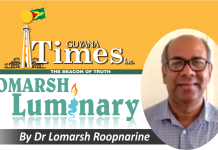I am composing this column in a room in the Intensive Care Unit (ICU) at the Cornell Weill Presbyterian Hospital in New York City. I am here because one of my brothers, aka “Blacks”, was struck down by a vehicle while biking from work about three weeks ago. The driver sped away from the scene. The Police accident report says it is a hit-and-run case, which I understand occurs quite regularly in the Big Apple. The investigative team is on top of the case and we are hopeful that there will be a break in the case soon.
I do not know what will become of “Blacks”, but the family is praying for him to survive this ordeal and that he will be able to get on with life. “Blacks” is a peaceful and athletic guy. He is a Respiratory Therapist and Educator. He holds a PhD from Columbia University.
The family is obviously in shock and extends its appreciation for the support it has received from everyone, near and afar. The outpouring of support has certainly provided some temporary comfort to the family, but let me say that on a personal level, this place sure feels like hell. I have seen a number of people wheeled in on stretchers, and for some, unfortunately, there will be no return to normalcy.
That said, I am not sure why I feel so inclined to forgive the driver of the hit-and-run vehicle, perhaps it is easier to forgive than to harbour feelings of anger. But the feelings of forgiveness do not mean that justice will not be pursued.
I shared the above information as a way of distracting myself from the daily dose of sadness, stirred more by regular but understandable outbursts from my mother, sister and other family members. At the core of their outbursts is this question: How come someone’s life can change so much in a few minutes when that person has nothing to do with it? I do not have an answer other than to say life is unpredictable even if things are predictable.
Fortunately, my distraction has been facilitated by continuous visits and varying conversations from the resident Guyanese in New York which, interestingly, have been dominated by unfolding events among illegal Guyanese in Queens, New York. I believe this information worth sharing.
From what I have gathered, the buzz word is that US immigration authorities have been raiding Guyanese-run businesses looking for illegal aliens, something that did not happen ever since Guyanese have been arriving in the New York City area in the 1970s. The consensus among the presumably legal resident Guyanese in the Queens area is that the raids have picked up anyone who is suspected to be illegal, not only those with criminal backgrounds. This is a departure from the initial focus of looking for illegal aliens with criminal backgrounds. I understand also there aren’t any court hearings for those who are captured by immigration authorities. One Guyanese told me that stores and restaurants around the Liberty area are virtually half-empty, since the illegal aliens have gone into hiding and, subsequently, business has become financially slow.
Interesting, too, is that the fees for fake marriages to obtain a green card have supposedly increased from US$10,000 to around US$30,000. Trump’s desperate policy of sending back undocumented immigrants has driven illegal Guyanese in more desperate modes of doing whatever it takes to stay in the US. Is Guyana such a bad place?
The anxiety level is obviously very high among the illegal community in the Guyanese Queens area, perpetuated by internal rivalry whereby common disputes in the Guyanese community are now interspersed with threats of turning illegal aliens in to immigration authorities. One illegal Guyanese told me that he had a dispute with another resident Guyanese over work and wages and he was told that if he did not shut up, he would be reported to US immigration authorities. It will be foolish to think that this is an isolated case.
There are an estimated 400,000 Guyanese in North America and I suspect about 50,000 are undocumented; a majority of them reside in the New York City area. It is not possible for US authorities to send back all illegal aliens to their respective countries, Guyana included. But it is reasonable to say that about 20,000 of them will be deported back to Guyana, especially if the Trump Administration maintains its current reckless and nefarious commitment to deport illegals from the US.
The question to ask here is, can Guyana handle the forceful return of so many deportees? The straightforward answer is no, mainly because Guyana and other Caribbean countries have not instituted sound programmes to deal with deportees. The leaders of these countries believe that deportees are really a US not a Caribbean problem premised mainly on the thought that deportees are more American than Caribbean. This argument cannot sustain itself any longer in light of the fact that the Trump Administration will withdraw badly-needed aid and programmes to Guyana if Guyana does not comply with its deportee initiative










